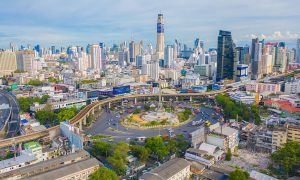Thailand's economy is dominated by tourism, manufacturing and agriculture, and in recent years, with the development of ASEAN economic integration, employment opportunities in the service sector, science and technology, and finance have been increasing. In addition, the Thai government encourages foreigners to take up high value-added jobs, so many technical and managerial positions are open toThailand ImmigrationOpen.
Hot Industries in Thailand
- Tourism & Hospitality
As a globally renowned tourist destination, Thailand's tourism and hospitality industry has always had a high demand for expatriates, especially in the areas of hotel management, customer service, and tour operations. - Education Industry
The education sector is a foreignimmigrantsOne of the main areas of employment, especially for English teaching positions. Many international schools and language training institutions require foreign teachers with relatively good salaries. - Information technology and the digital economy
With Thailand's digital transformation, there is a rising demand in the IT field, including positions in software development, cybersecurity, and data analytics. - International trade and logistics
As a major trading hub in Southeast Asia, Thailand has a high demand for expatriates in the foreign trade and logistics industry, especially among foreign-owned companies. - Finance and investment industry
With the increasing influx of foreign capital, the financial and investment industry offers a number of positions suitable for expatriates, such as financial analysts and corporate consultants.
II. Common channels for finding a job in Thailand
- job board
Major job boards in Thailand include:- JobThai
- JobsDB
- Glassdoor
There are a large number of jobs posted on these platforms for expats, especially in international companies and technical positions.
- Social media and professional communities
There are many job groups for expatriates on Facebook and LinkedIn, such as "Bangkok Expats Jobs", which you can join to look for opportunities. - executive search firm
There are a number of professional headhunters in Thailand, especially in cities such as Bangkok and Chiang Mai. These firms usually provide recruitment services for high-end positions and can help you find the right job quickly. - Local expatriate communities and forums
Expat communities such as Internations and forums such as ThaiVisa often share job postings and opportunities. - Direct contact with companies
If you are interested in a company, you can check the job postings directly on the company's official website or send a resume and cover letter to express your interest. - offline job fair
Job fairs for expatriates are held from time to time in places such as Bangkok and Chiang Mai, and this is a good opportunity to get in touch with employers directly.
III. Work Visa Applications for Foreigners
To work legally in Thailand, you need a valid work visa (Non-Immigrant B Visa) and a work permit (Work Permit). Below is the application process:
- Getting a job offer
First, find a Thai company that is willing to hire you and have the employer provide a formal job offer letter. - Applying for a Nonimmigrant B Visa
After receiving a job offer, you will need to apply for a Non-Immigrant B visa at the Thai Embassy or Consulate in your country. - Application for a work permit
Upon arrival in Thailand, your employer will assist you in applying for a work permit from the Thai Ministry of Labor. The following documents are usually required:- Employer's corporate documents
- A copy of your passport and a copy of your visa
- proof of academic qualifications
- two-inch photo
take note of: The Thai government has restrictions on the range of occupations available to expatriates, for example, handicraft-related positions are usually not open to expatriates.
IV. How to improve the success rate of job search in Thailand
- Enhancement of language skills
Although English is the working language of many foreign companies, learning basic Thai can significantly improve your competitiveness, especially in the service industry and with local companies. - Customized Resume
Tailor your resume and cover letter to the requirements of the position, highlighting your international experience and professional skills. - widen one's circle
Networking is very important for job hunting in Thailand. Attend social events, industry forums and seminars to meet potential employers or references. - Understanding Cultural Differences
Thai workplace culture emphasizes politeness and humility. Showing respect for Thai culture during the interview will be a plus for you. - Consider part-time or remote work
If a full-time job is temporarily unavailable, consider working part-time or remotely first to gain work experience and contacts in Thailand.
V. Cost of Living and Salary Levels for Working in Thailand
cost of living
The cost of living in Thailand varies from city to city, being relatively high in Bangkok, while cities like Chiang Mai and Pattaya are more affordable. Here are some common expenses:

- shelter: Condominium rentals are around 10,000 to 30,000 baht per month.
- transportation: Bangkok MRT and buses cost around 20 to 50 baht.
- gastronomy: A meal in an ordinary restaurant is about 50 to 150 baht, and higher in a high-end restaurant.
pay level
Expatriates usually earn higher salaries than local Thais, but the exact income depends on the industry and position. Here are some references:

- English teacher: approximately 30,000 to 60,000 baht/month
- IT Engineer: about 50,000 to 100,000 baht/month
- Management positions in international companies: approximately 100,000 baht/month or more
VI. Advantages and challenges of working in Thailand
dominance
- Diverse job opportunities: Thailand's open job market has a strong demand for skilled personnel.
- Culture and Life Experience: Thailand's unique cultural and natural environment has attracted numerous expatriates.
- Tax incentives: Thailand's personal income tax is relatively low, and some expatriates are eligible for tax incentives.
challenge
- Complex visa and work permit requirements: Strict compliance with the relevant laws is required or you may face fines or expulsion.
- cultural difference: Need to adapt to Thai work culture, such as hierarchy and slower pace of work.
concluding remarks
Finding a job in Thailand is a process full of opportunities and challenges for immigrants. Through thorough preparation, active networking and cultural adaptation, you will be able to assimilate into the Thai workplace and find the right direction for yourself. Whether it's through recruitment platforms, headhunters or direct communication with employers, being clear about your goals and planning is the key to a successful job search. We hope this guide will help you start your career inImmigration to Thailandand realize their personal values and dreams in this welcoming and diverse land!






